
Das Lied von der Erde
The Song of the Earth is a large-scale work for two vocal soloists and orchestra by the Austrian-Bohemian composer Gustav Mahler. Laid out in six separate movements, each of them an independent song, the work is described on the title-page as Eine Symphonie für eine Tenor- und eine Alt- (oder Bariton-) Stimme und Orchester (nach Hans Bethges "Die chinesische Flöte") – ("A Symphony for Tenor and Alto (or Baritone) Voice and Orchestra (after Hans Bethge's 'The Chinese Flute')"). Bethge's text was published in the autumn of 1907. Mahler's use of 'Chinese' motifs in the music is unique in his output. Composed in the years 1908–1909, it followed the Eighth Symphony, but is not numbered as the Ninth, which is a different work.

Das Trinklied vom Jammer der Erde
The first movement, "The Drinking Song of Earth's Misery", continually returns to the refrain, Dunkel ist das Leben, ist der Tod (literally, "Dark is life, is death"), which is pitched a semitone higher on each successive appearance. Like many drinking poems by Li Po, the original poem "Bei Ge Xing" (a pathetic song) (Chinese:悲歌行) mixes drunken exaltation with a deep sadness. The singer's part is notoriously demanding, since the tenor has to struggle at the top of his range against the power of the full orchestra. This gives the voice its shrill, piercing quality, and is consistent with Mahler's practice of pushing instruments, including vocal cords, to their limits. According to philosopher Theodor W. Adorno, the tenor should here create the impression of a "denatured voice in the Chinese (falsetto) style", perhaps in the style of Peking opera. "The wine in the golden cup calls us, but first let me sing you a song of sorrow which shall ring laughingly in your soul. When sorrow comes the gardens of the soul lie waste, joy and song fade and die: Dark is life, dark is death. Master of this house! Your cellar is full of golden wine! This lyre I shall call mine, for emptying the glass and sounding the lyre are things that go together. A full beaker of wine at the right time is worth more than all the riches of this world: Dark is life, dark is death. The sky is endlessly blue, and the earth will long remain, and bloom in Spring. But you, Man, how long will you remain? Not even a hundred years shall you enjoy all the mouldering trinkets of this earth! A wild, ghostly figure crouches in the moonlight on the tombs - it is an Ape! Listen, its howling cuts through the sweet scent of Life. Now, drink the wine! Now is the time, comrades! Empty your golden cups to the lees! Dark is life, dark is death."
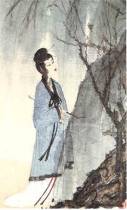
Der Einsame im Herbst
"The lonely one in Autumn" is a much softer, less turbulent movement. Marked 'somewhat dragging and exhausted', it begins with a repetitive shuffling in the strings, followed by solo wind instruments. The lyrics, which are based on a Tang Dynasty era poem by Chang Tsi, lament the dying of flowers and the passing of beauty. The orchestration in this movement is sparse and chamber music-like, with long and independent contrapuntal lines. "Autumn mists roll across the lake, as if a dust of Jade had been spread over the flowers, and their scent is gone. The withered lotus leaves will soon float on the lake waters. My heart is weary, and I come to this beautiful place of rest, for I need solace: I weep much in my loneliness. Autumn lasts too long in my heart: Sun of Love, will you never shine and dry away my bitter tears?"

Von der Jugend
The third movement, "Of Youth" (for tenor), is the most obviously pentatonic and faux-Asian. The form is ternary, the third part being a greatly abbreviated revision of the first.
"A pavilion of green and white porcelain stands in the middle of a tiny pond. Like a tiger's back, a Jade bridge arches over to it. Inside the house beautifully-dressed friends drink and chat, and some write poetry: their silk sleeves slip back and their silk caps hang cheerfully over their necks. Everything is marvellously reflected in the still surface of the water. Everything stands on its head in the green and white pavilion. The bridge is like a half moon, the arch upturned. Beautifully dressed friends drink and chat."
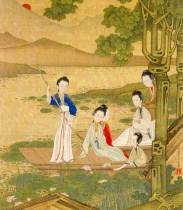
Von der Schönheit
The music of this movement, "Of Beauty", is mostly soft and legato, with a loud articulated section in the brass as the young men ride by. There is a long orchestral postlude to the sung passage. "Maidens gather blossoms in their laps as they sit among the bushes of the river bank, and the sunlight reflects them in the water. Handsome youths ride past on horses among the willows, trampling the flowers. The loveliest of the maidens looks on the handsome young man with burning desire, her heart's excitement beseeching him through her gaze behind her mask of pride."
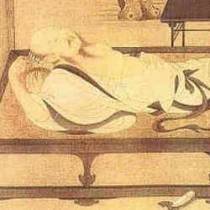
Der Trunkene im Frühling
The scherzo of the work is represented by the fifth movement, "The drunken man in Spring". Like the first, it opens with a horn theme. In this movement Mahler uses extensive variety of tempo, which alters every few measures. The middle section features a solo violin and solo flute. "If Life is a dream, why all this work and worry? I drink all day, till I can drink no more! Then I roll home and sleep. When I wake, a bird is singing, and I ask him if Spring has come. Yes! he replies, it came last night, and he sings and laughs, and I listen in wonder. And I fill my cup and drain it, and sing till the moon fills the night sky, and fall asleep again. What's the Spring to me? Just let me be drunk!"
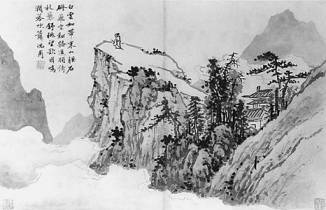
Der Abschied
The final movement, "The Farewell", is nearly as long as the previous five movements combined. Its text is drawn from two different poems, both involving the theme of leave-taking. "The sun sinks beyond the hills, evening descends into the valleys with its cooling shade. See, like a silver boat the moon sails up into the lake of the sky. I sense a soft wind blowing beyond the dark fir-trees. The brook sings melodiously through the dark. The flowers grow pale in the twilight. The earth breathes a deep draught of rest and sleep. All longing now will dream: tired people go homewards, so that they can learn forgotten joy and youth again in sleep! Birds sit motionless on their branches. The world is slumbering! It grows cool in the shade of my fir-trees. I stand and await my friend, I wait for him for our last farewell. O friend, I long to share the beauty of this evening at your side. Where do you linger? Long you leave me alone! I wander here and there with my lyre on soft grassy paths. O Beauty! O endless love-life-drunken world! He dismounted from the horse and handed to him the drink of farewell. He asked him where he was bound and why it must be so. He spoke, and his voice was muffled: 'You, my friend, Fortune was not kind to me in this world! Where do I go? I am departing, I wander in the mountains. I am seeking rest for my lonely heart. I am making my way to my home, my abode. I shall never stray far away. My heart is still and awaits its moment.' The beloved Earth blooms forth everywhere in Spring, and becomes green anew! Everywhere and endlessly blue shines the horizon! Endless... endless..." (The last lines were added by Mahler himself.) The singer repeats the final word like a mantra, accompanied by a sparse mix of strings, mandolin, harps, and celesta, until the music fades into silence, the final chord "imprinted on the atmosphere" as Benjamin Britten put it. The last movement is very difficult to conduct because of its cadenza writing for voice and solo instruments, which often flows over the barlines, "Ohne Rücksicht auf das Tempo" (Without regard for the tempo) according to Mahler's own direction. Bruno Walter related that Mahler showed him the score of this movement and asked, "Do you know how to conduct this? Because I certainly don't." Mahler also hesitated to put the piece before the public because of its relentless negativity, unusual even for him. "Won't people go home and shoot themselves?" he asked.
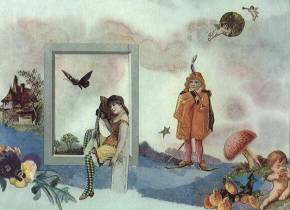
Kindertotenlieder
Songs on the Death of Children is a song cycle for voice and orchestra by Gustav Mahler. The words of the songs are poems by Friedrich Rückert. The original Kindertotenlieder were a group of 428 poems written by Rückert in 1833–34 in reaction to the illness (scarlet fever) and death of his two children Luise and Ernst. Painter describes the poems thus: "Rückert's 428 poems on the death of children became singular, almost manic documents of the psychological endeavor to cope with such loss. In ever new variations Rückert's poems attempt a poetic resuscitation of the children that is punctuated by anguished outbursts. But above all the poems show a quiet acquiescence to fate and to a peaceful world of solace." These poems were not intended for publication. Mahler selected five of Rückert's poems to set as Lieder, which he composed between 1901 and 1904. The songs are written in Mahler's late-romantic idiom, and like the texts reflect a mixture of feelings: anguish, fantasy resuscitation of the children, resignation. The final song ends in a major key and a mood of transcendence. The poignancy of the cycle is increased by the fact that four years after he wrote it, Mahler lost his daughter, Maria, aged four, to scarlet fever. He wrote to Guido Adler: "I placed myself in the situation that a child of mine had died. When I really lost my daughter, I could not have written these songs any more."
"Nun will die Sonn' so hell aufgeh'n"
Nun will die Sonn' so hell aufgeh'n
Als sei kein Unglück die Nacht gescheh'n.
Das Unglück geschah nur mir allein.
Die Sonne, sie scheinet allgemein.
Du musst nicht die Nacht in dir verschränken
Musst sie ins ew'ge Licht versenken.
Ein Lämplein verlosch in meinem Zelt,
Heil sei dem Freudenlicht der Welt.
"Nun seh' ich wohl, warum so dunkle Flammen"
Nun seh' ich wohl, warum so dunkle Flammen
Ihr sprühtet mir in manchem Augenblicke.
O Augen, gleichsam, um in einem Blicke
Zu drängen eure ganze Macht zusammen.
Doch ahnt' ich nicht, weil Nebel mich umschwammen,
Gewoben vom verblendenden Geschicke,
Daß sich der Strahl bereits zur Heimkehr schicke,
Dorthin, von wannen alle Strahlen stammen.
Ihr wolltet mir mit eurem Leuchten sagen:
Wir möchten nah dir immer bleiben gerne!
Doch ist uns das vom Schicksal abgeschlagen.
Sieh' recht uns an, denn bald sind wir dir ferne!
Was dir noch Augen sind in diesen Tagen:
In künft'gen Nächten sind es dir nur Sterne.
"Wenn dein Mütterlein"
Wenn dein Mütterlein
tritt zur Tür herein,
Und den Kopf ich drehe,
ihr entgegen sehe,
Fällt auf ihr Gesicht
erst der Blick mir nicht,
Sondern auf die Stelle,
näher nach der Schwelle,
Dort, wo würde dein
lieb Gesichten sein,
Wenn du freudenhelle
trätest mit herein,
Wie sonst, mein Töchterlein.
Wenn dein Mütterlein
tritt zur Tür herein,
Mit der Kerze Schimmer,
ist es mir, als immer
Kämst du mit herein,
huschtest hinterdrein,
Als wie sonst ins Zimmer!
O du, des Vaters Zelle,
Ach, zu schnell
erloschner Freudenschein!
"Oft denk' ich, sie sind nur ausgegangen"
Oft denk' ich, sie sind nur ausgegangen,
Bald werden sie wieder nach Hause gelangen,
Der Tag ist schön, o sei nicht bang,
Sie machen nur einen weiten Gang.
Ja wohl, sie sind nur ausgegangen,
Und werden jetzt nach Haus gelangen,
O, sei nicht bang, der Tag is schön,
Sie machen den Gang zu jenen Höh'n.
Sie sind uns nur voraus gegangen,
Und werden nicht nach Haus verlangen,
Wir holen sie ein auf jenen Höh'n
Im Sonnenschein, der Tag is schön.
"In diesem Wetter!"
In diesem Wetter, in diesem Braus,
Nie hätt' ich gesendet die Kinder hinaus;
Man hat sie getragen hinaus,
Ich durfte nichts dazu sagen!
In diesem Wetter, in diesem Saus,
Nie hätt' ich gelassen die Kinder hinaus,
Ich fürchtete sie erkranken;
Das sind nun eitle Gedanken.
In diesem Wetter, in diesem Graus,
Nie hätt' ich gelassen die Kinder hinaus;
Ich sorgte, sie stürben morgen,
Das ist nun nicht zu besorgen.
In diesem Wetter, in diesem Graus!
Nie hätt' ich gesendet die Kinder hinaus!
Man hat sie hinaus getragen,
ich durfte nichts dazu sagen!
In diesem Wetter, in diesem Saus, in diesem Braus,
Sie ruh'n als wie in der Mutter Haus,
Von keinem Sturm erschrecket,
Von Gottes Hand bedecket.

Lieder eines fahrenden Gesellen
Songs of a Wayfarer is Gustav Mahler's first song cycle. While he had previously written other lieder, they were grouped by source of text or time of composition as opposed to common theme. The four-movement cycle, for low voice (but often performed by a female singer), were inspired by the conclusion of Mahler's unhappy love affair with soprano Johanna Richter, whom he met while conductor of the opera house in Kassel, Germany. The work's compositional history is complex and difficult to trace. Mahler appears to have begun composing the songs in December 1884 and to have completed them in 1885. He subjected the score to a great deal of revision, however, probably between 1891 and 1896, and some time in the early 1890s orchestrated the original piano accompaniments. As a result of this situation, various discrepancies exist between the different sources. It appears to have been in the orchestral version that the cycle was first performed, in 1896, but possible indications of an earlier, voice-and-piano performance cannot be discounted. The work was published in 1897 and is one of Mahler's most well-known compositions. The lyrics are by the composer himself, though they are influenced by Des Knaben Wunderhorn, a collection of German folk poetry that was one of Mahler's favorite books, and the first song is actually based on the Wunderhorn poem "Wann mein Schatz". There are strong connections between this work and Mahler's First Symphony, with the main theme of the second song being the main theme of the 1st Movement and the final verse of the 4th song reappearing in the 3rd Movement as a contemplative interruption of the funeral march.
"Wenn mein Schatz Hochzeit macht"
Wenn mein Schatz Hochzeit macht,
Fröhliche Hochzeit macht,
Hab' ich meinen traurigen Tag!
Geh' ich in mein Kämmerlein,
Dunkles Kämmerlein,
Weine, wein' um meinen Schatz,
Um meinen lieben Schatz!
Blümlein blau! Verdorre nicht!
Vöglein süß!
Du singst auf grüner Heide.
Ach, wie ist die Welt so schön!
Ziküth! Ziküth!
Singet nicht! Blühet nicht!
Lenz ist ja vorbei!
Alles Singen ist nun aus!
Des Abends, wenn ich schlafen geh',
Denk'ich an mein Leide!
An mein Leide!
"Ging heut Morgen übers Feld"
Ging heut morgen übers Feld,
Tau noch auf den Gräsern hing;
Sprach zu mir der lust'ge Fink:
"Ei du! Gelt? Guten Morgen! Ei gelt?
Du! Wird's nicht eine schöne Welt?
Zink! Zink! Schön und flink!
Wie mir doch die Welt gefällt!"
Auch die Glockenblum' am Feld
Hat mir lustig, guter Ding',
Mit den Glöckchen, klinge, kling,
Ihren Morgengruß geschellt:
"Wird's nicht eine schöne Welt?
Kling, kling! Schönes Ding!
Wie mir doch die Welt gefällt! Heia!"
Und da fing im Sonnenschein
Gleich die Welt zu funkeln an;
Alles Ton und Farbe gewann
Im Sonnenschein!
Blum' und Vogel, groß und Klein!
"Guten Tag,
ist's nicht eine schöne Welt?
Ei du, gelt? Schöne Welt!"
Nun fängt auch mein Glück wohl an?
Nein, nein, das ich mein',
Mir nimmer blühen kann!
"Ich hab'ein glühend Messer"
Ich hab'ein glühend Messer,
Ein Messer in meiner Brust,
O weh! Das schneid't so tief
in jede Freud' und jede Lust.
Ach, was ist das für ein böser Gast!
Nimmer hält er Ruh',
nimmer hält er Rast,
Nicht bei Tag, noch bei Nacht,
wenn ich schlief!
O weh!
Wenn ich den Himmel seh',
Seh'ich zwei blaue Augen stehn!
O weh! Wenn ich im gelben Felde geh',
Seh'ich von fern das blonde Haar
Im Winde weh'n!
O weh!
Wenn ich aus dem Traum auffahr'
Und höre klingen ihr silbern Lachen,
O weh!
Ich wollt', ich läg auf der
Schwarzen Bahr',
Könnt' nimmer die Augen aufmachen!
"Die zwei blauen Augen von meinem Schatz"
Die zwei blauen Augen
von meinem Schatz,
Die haben mich in die
weite Welt geschickt.
Da mußt ich Abschied nehmen vom allerliebsten Platz!
O Augen blau,
warum habt ihr mich angeblickt?
Nun hab' ich ewig Leid und Grämen!
Ich bin ausgegangen
in stiller Nacht
wohl über die dunkle Heide.
Hat mir niemand Ade gesagt
Ade!
Mein Gesell' war Lieb und Leide!
Auf der Straße stand ein Lindenbaum,
Da hab' ich zum ersten Mal
im Schlaf geruht!
Unter dem Lindenbaum,
Der hat seine Blüten
über mich geschneit,
Da wußt' ich nicht, wie das Leben tut,
War alles, alles wieder gut!
Alles! Alles, Lieb und Leid
Und Welt und Traum!
*********************

Jascha Horenstein
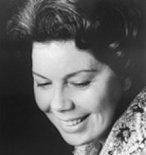
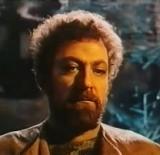
Janet Baker Norman Foster
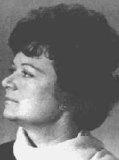

Alfreda Hodgson Carmen Luisa Letelier


John Mitchinson Marian Anderson
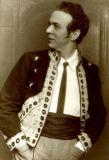
Heinrich Rehkemper
**********
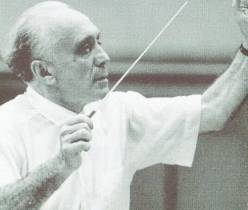
JASCHA HORENSTEIN
conducts
GUSTAV MAHLER
************
Das Lied von der Erde

